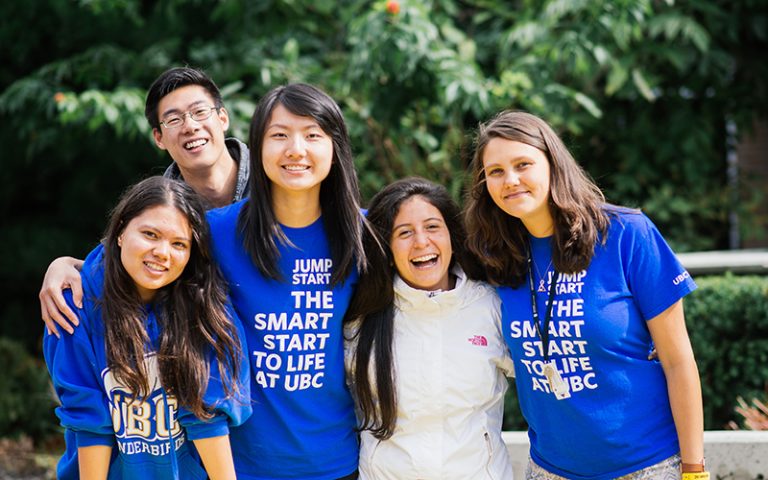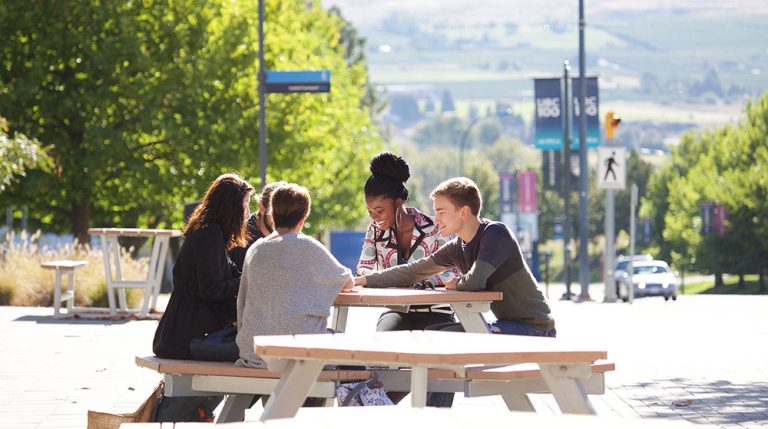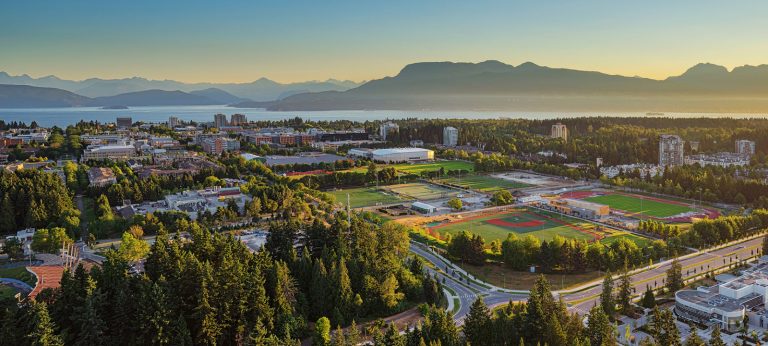- Programs
- Applying to UBC
- Admission requirements
- Canadian high schools
- International high schools
- International Baccalaureate students
- Advanced Placement students
- University or college transfer students
- Mature students
- English language competencyIndigenous admissionsHow to apply
- Plan for UBC
- Choosing a university
- Choose what to study
- First-year credit
- Write your personal profile
- Complete the application
- Disability-related considerations
- Working with an education agent
After you’ve applied- Submit your documents
- First-year credit
- First-year study options
- How to change the degree you applied to
- Appeals
After you’ve been admitted
Your UBC adventure starts here
As a visiting student at UBC, you’ll join a diverse academic community at a world-class university in an inspiring setting. Are you ready to take your place alongside top students from across Canada and around the world? Let’s get started.
-
TOP 40
research universities in the world
-
2
distinctive BC campus experiences
-
#1
most international university in North America
-
TOP 40
research universities in the world
-
2
distinctive BC campus experiences
-
#1
most international university in North America
Step 1: Submit or update your preferred courses
If you’ve yet to submit a list of preferred courses, please complete your Visiting Student Course List as soon as possible.
If you’ve already submitted your list of preferred courses, you may need to update it depending on when you sent us your initial Visiting Student Course List, as course schedules are released in the spring for the Winter Session (September to April) and in the winter for the Summer Session (May to August).
Visiting students course syllabi
Curious what types of courses you can take as a visiting student? Explore some of our course syllabi below.
This is only a sample of the syllabi that we offer. You can access our full list of courses by semester on our course schedule. If you need a specific course syllabus that’s not listed here, please reach out to the course’s department.
Science
Program Course Chemistry All CHEM courses Computer Science CPSC 304: Introduction to Relational Databases Computer Science CPSC 310: Introduction to Software Engineering Computer Science CPSC 317: Introduction to Computer Networking Computer Science CPSC 340: Machine Learning Computer Science CPSC 406: Computational Optimization Computer Science CPSC 447: Intro to Visualization Arts
Program Course Economics All ECON courses Economics ECON 325: Introduction to Empiracal Economics Economics ECON 371: Economics of the Environment Political Science POLI 334: Comparative Democratization Political Science POLI 347: Law and Political Theory Political Science POLI 351: Environmental Politics and Policy Political Science POLI 372: Multinational Corporations and Globalization Political Science POLI 405: Urban Governance and Policy in Canada Political Science POLI 450: Policy Analysis Political Science POLI 464: NGOs in International Politics Psychology Psychology Course Syllabi (Okanagan Campus) Psychology Psychology Course Syllabi (Vancouver Campus) Commerce
Program Course Commerce All COMM courses Commerce COMM 470: Venture Capital Commerce COMM 483: Leadership and General Management Step 2: Apply for a study permit or visa
Depending on your country of nationality and length of stay, you may require a study permit or visa to attend UBC.
Canadian citizens and permanent residents
If you are a Canadian citizen or permanent resident of Canada, you do not require a study permit or visa.
International students studying for less than six months
Depending on your country of nationality, you will need either a Temporary Resident Visa (TRV) or an Electronic Travel Authorization (eTA).
International students studying for more than six months
You will need to obtain a valid study permit before beginning your studies at UBC.
Step 3: Plan your finances
UBC tuition is calculated on a per-credit basis (most courses are three credits each) and student fees are calculated according to your status (full-time or part-time), session, and study level.
To pay your tuition and fees, you are encouraged to use UBC’s Western Union international funds transfer. This method lets you pay in your home currency, secure a competitive exchange rate for up to 72 hours, and avoid additional transaction fees. No Canadian banking account is required.
Okanagan campus
Vancouver campus
If you are a sponsored student or are applying for government grants and require additional documentation for your sponsoring body or government, please let us know as soon as possible by emailing recruit.intl@ubc.ca.

UBC Admissions blog
All the ways you can pay your UBC fees
Read moreThere are many different ways to pay your tuition, student fees, and residence and meal plan fees. The payment options available will depend on the specific type of fee you’re paying, which bank you are using, which campus you’re attending, and where you are in the world.
Step 4: Find a place to live
Where you live will shape your UBC experience – from who you meet to what you eat. On-campus housing options are limited on UBC’s Vancouver and Okanagan campuses, so most visiting students live off campus in Vancouver or Kelowna.
Step 5: Course registration
Course registration for visiting students and non-classified students opens in mid-July. Once registration opens, UBC will complete an initial course registration for you based on your Visiting Student Course List. After that, you’ll receive an email on how to add or drop courses on your own, should you wish to do so. Course registration will continue throughout the summer and into the first two weeks of classes in September (Term 1) and January (Term 2), so please keep in mind that it is normal that your course registration may not be complete until that time.
Step 6: Review your medical coverage
As a UBC student, you will have access to a wide range of health and wellness support services should you need medical attention.
Students in BC for less than six months
You will automatically be enrolled in two plans when you register for courses at UBC:
- a mandatory temporary basic health insurance plan called iMED, which will cover you for three months
- an extended health and dental plan offered by the UBC Students’ Union Okanagan (UBCSUO) or the Alma Mater Society/Graduate Student Society (AMS/GSS), which will cover you for eight or 12 months (depending on when your studies begin)
If you plan to stay in BC for more than three months (e.g., for a four-month term), you will need to extend your iMED coverage.
Temporary health insurance (iMED)
Students in BC for more than six months
You must enrol in the BC Medical Services Plan (MSP), a basic health insurance policy that is legally required for anyone who is planning to live in BC for longer than six months and not already covered by another provincial health plan.
In addition, you will automatically be enrolled in two plans when you register for courses at UBC:
- a mandatory temporary basic health insurance plan called iMED, which will cover you for the three-month period before your MSP coverage takes effect
- an extended health and dental plan offered by the UBC Students’ Union Okanagan (UBCSUO) or the Alma Mater Society/Graduate Student Society (AMS/GSS), which will cover you for eight or 12 months (depending on when your studies begin)
BC Medical Services Plan (MSP)
Step 7: Get ready for orientation
Whether you’re from Germany or Mexico, studying for one term or two, UBC is ready to welcome you on campus. Keep an eye on your email for pre-arrival information, updates, and invitations to participate in social media networking groups and orientation events. Once you arrive on campus we’ll introduce you to UBC and the surrounding area.



Contact us
If you have questions about preparing for life at UBC, we can help. Be sure to include your UBC student number in the subject line of your email and identify yourself as a visiting student through the International Student Initiative.
Okanagan students
- Questions about your application and supporting documents: recruit.intl@ubc.ca
- Questions about immigration, study permits, and medical insurance: ips.ubco@ubc.ca
- Questions about course registration, orientation, housing, and academic advising: goglobal.okanagan@ubc.ca
Vancouver students
- Questions about your application and supporting documents: recruit.intl@ubc.ca
- Questions about immigration, study permits, and medical insurance: isa@students.ubc.ca
- Questions about course registration, orientation, housing, and academic advising: go.global@ubc.ca
Ready to start your UBC adventure?
We can’t wait to see you on campus.

